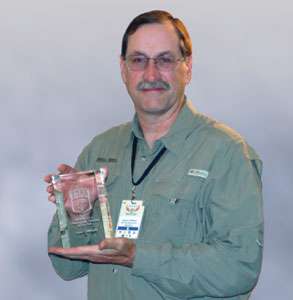
SHREVEPORT-BOSSIER CITY, La. — While Skeet Reese celebrated his Classic victory with sponsors, family and friends, BASS/ESPN Outdoors took time to recognize the accomplishments of other champions whose contributions to this sport may far exceed that of all Classic winners combined.
The “others” are the leaders of the B.A.S.S. Federation Nation. Among those honored during the annual Champion’s Toast was a quiet, unassuming fisheries biologist from Oklahoma who has spent his entire life helping protect the nation’s fisheries resources. That unheralded champion was Gene Gilliland, who was named 2009 Conservation Director of the Year.
For those inside the national recreational fishing industry — from resource managers to avid bass anglers across the United States — Gilliland’s recognition was viewed as well-deserved and maybe long overdue.
As a regular columnist for BASS Times and frequent contributor to several popular Internet sites such as The Bass Zone (www.basszone.com) and Bassmaster.com, Gilliland has developed a national reputation as someone who has been successful in bridging the gap between a recreational activity and the scientific side of resource management.
A good example of this is a project that Gilliland helped BASS spearhead back in the 1990s. That project eventually became Keeping Bass Alive, the manual that has helped fishermen across the United States reduce the impact of delayed fish mortality during competitive fishing events.
Working closely with Dr. Hal Schramm and the BASS conservation department, that information is still considered the definitive source on how to conduct a tournament without negatively affecting the natural resource.
“I joined BASS in 1969 but was not exposed to the Federation until the early 1990s, when my research on tournament weigh-ins attracted the attention of Al Mills, the former BASS conservation director,” explained Gilliland.
“He invited me to a conservation workshop to discuss a program I had started in Oklahoma where we loaned portable fish-friendly weigh-in kits to bass clubs.”
The seeds of Gilliland’s passion for bass fishing were sown at a very young age. Born in Texas near Lake Texoma, Gilliland was introduced to the sport by an uncle.
He carried that youthful interest and enthusiasm for bass fishing to college where he graduated with two fisheries degrees — one from Texas A&M and another from Oklahoma State University.
After graduation, he went to work for the Oklahoma Department of Wildlife Conservation (ODWC), where he has spent the last 26 years helping others catch more fish.
Today, he spends the majority of his time working on the state’s Florida-strain genetics program while assisting local anglers on a variety of habitat and plant management issues. Surprisingly, he said, his job with the ODWC and his involvement in tournament fishing and the B.A.S.S. Federation Nation are a perfect match.
“[The ODWC] sees tournaments as a legitimate use of the resource and tournament anglers as our staunchest allies in fighting to protect our aquatic resources and fishing access,” he said.
Gilliland’s impact on this sport has gradually extended far beyond the red ground of Oklahoma through his association with the B.A.S.S. Federation Nation.
“Through my connections with BASS and the exposure this organization has afforded our fish care agenda, I’ve seen a huge change in the attitudes and behaviors of tournament anglers over the past 15 years,” said Gilliland.
Among the many changes has been a vested interest in resource management, according to Gilliland.
Because he has worn many hats — biologist, state employee, bass club president, outdoor journalist and avid bass angler — Gilliland is keenly aware of the many threats facing our sport. He believes apathy is the bass fisherman’s Achilles’ heel.
“Too many anglers are waiting until there is a crisis then trying to react, rather than being proactive and getting out ahead of the problems facing us,” Gilliland said.
After accepting the award for 2009 Conservation Director of the Year, Gilliland appeared truly humbled by it and grateful for the recognition.
“I didn’t get into fisheries or conservation for the money or the applause because there’s very little of either in those two things,” he laughed.
“I got into it because I’ve always had a passion for the sport of bass fishing and for the resource. I’ve been blessed to have a job and a hobby that mesh so perfectly.”
Other 2009 B.A.S.S. Federation Nation award winners were a Canadian club and a state chapter.
Releasing revisited
During the annual meetings of the B.A.S.S. Federation Nation in Shreveport-Bossier City in February, BASS Conservation Director Chris Horton announced that an updated version of Keeping Bass Alive will be available soon. The highly acclaimed information was compiled by Oklahoma fisheries biologist Gene Gilliland and Dr. Hal Schramm, working together with the BASS conservation department. The information represents years of studies involving proper fish handling and tournament equipment to further reduce delayed mortality and stress in tournament creels. The updated information will be available this month in the Conservation section on www.bassmaster.com.
| For more great stories and the latest bass fishing news, subscribe to BASS Times. Call 877-BASS-USA to order today. |




